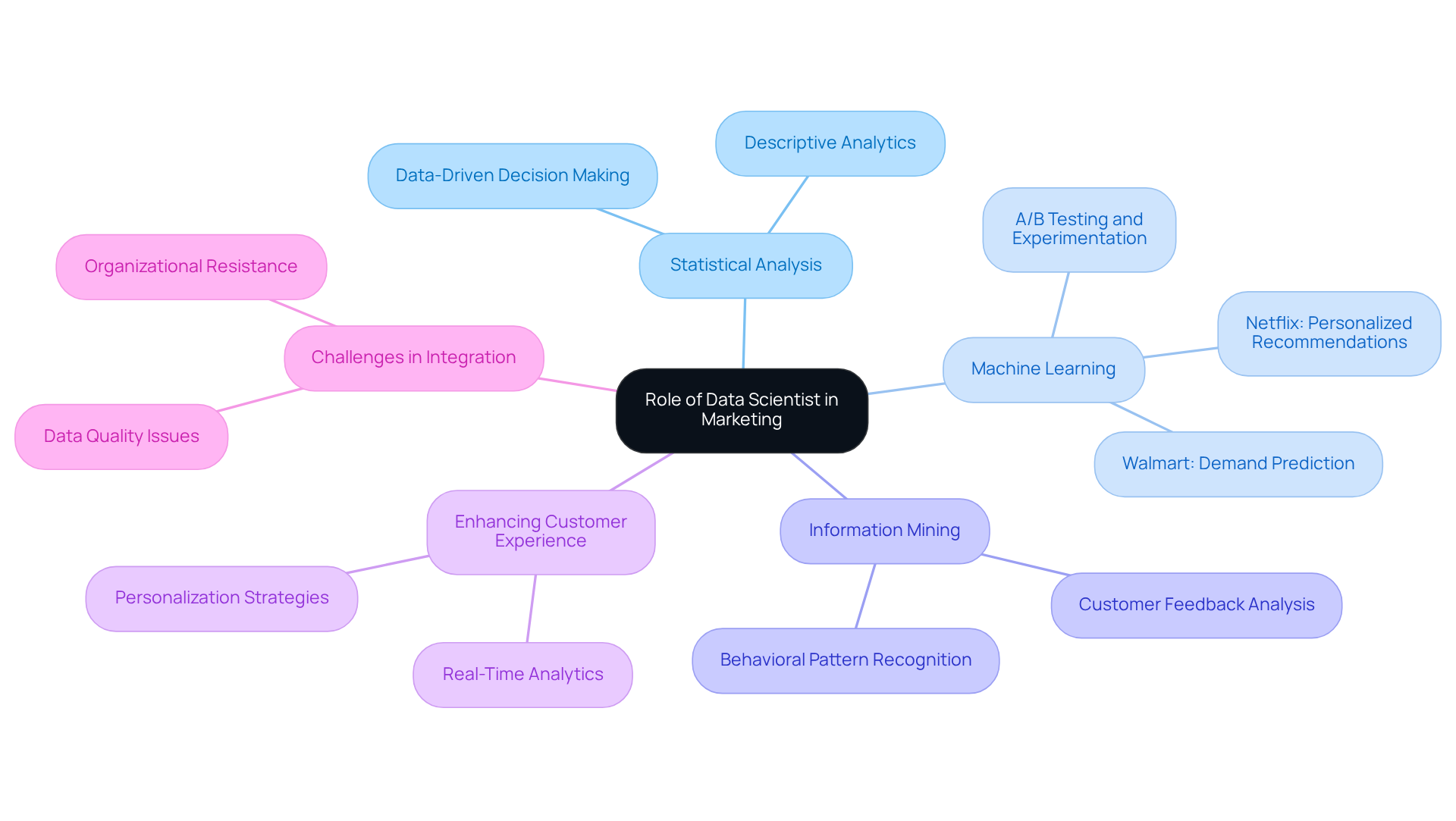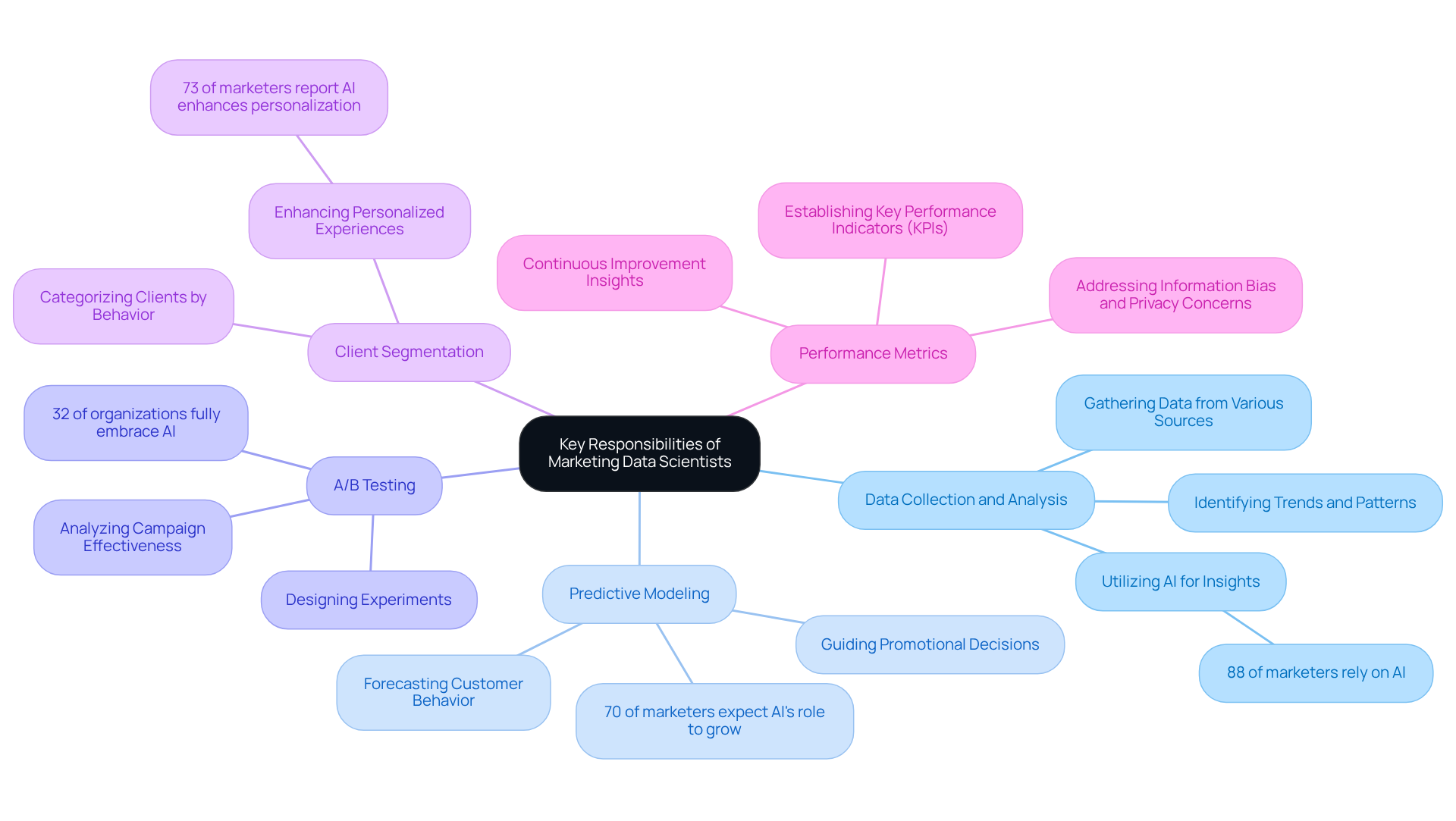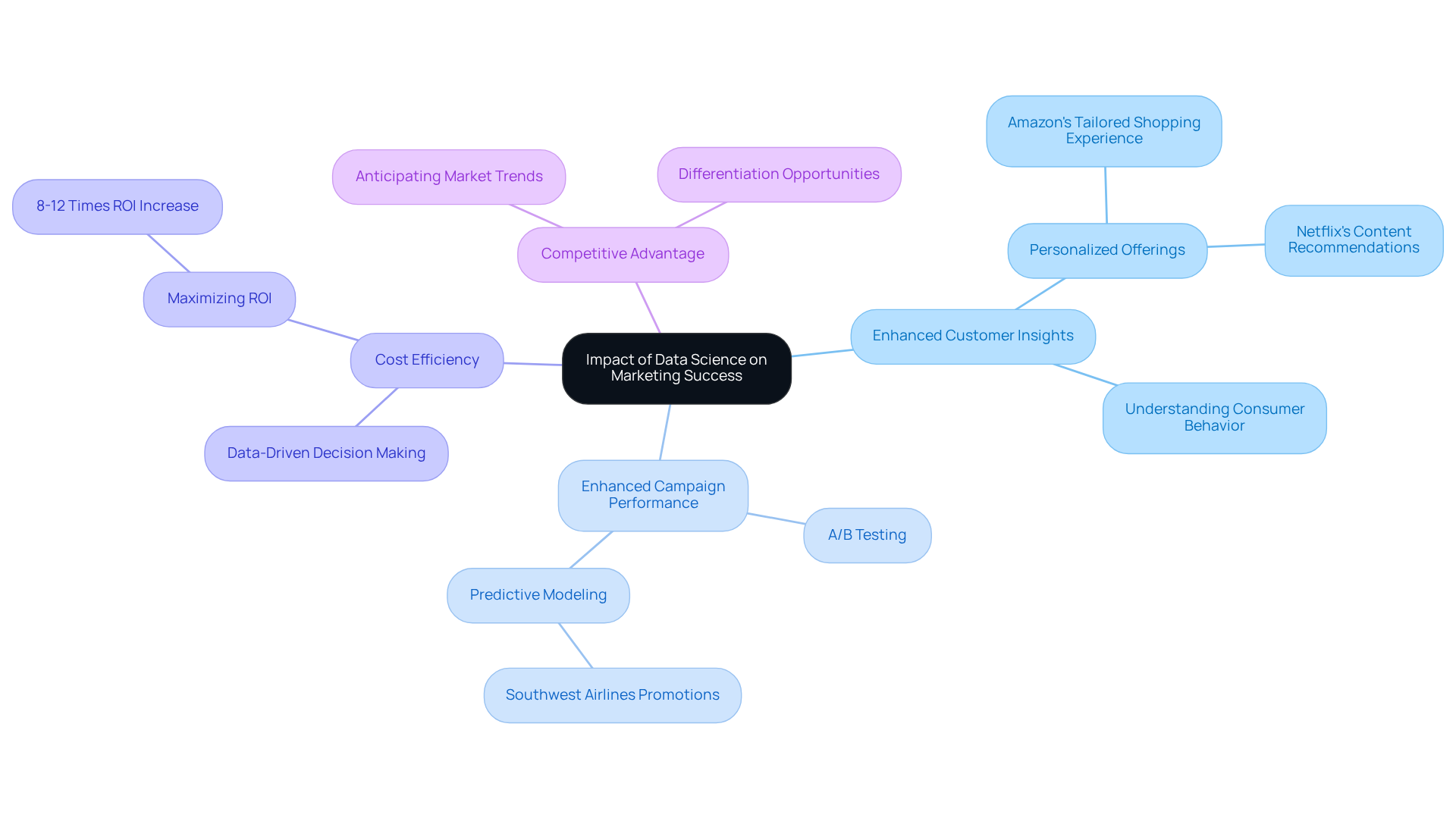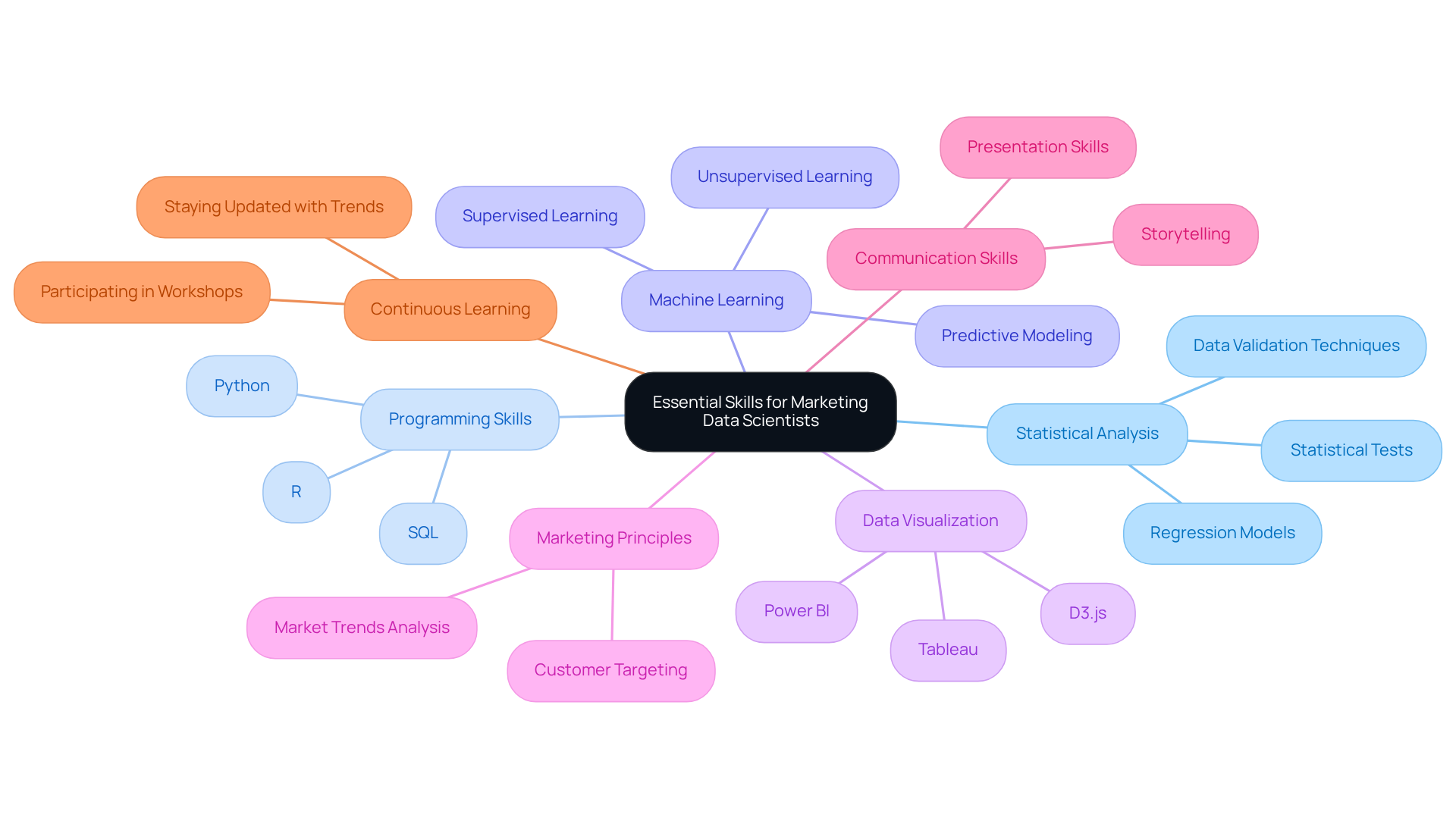
Overview
A data scientist in marketing for direct-to-consumer (DTC) brands is pivotal in analyzing consumer behavior, optimizing promotional strategies, and enhancing customer experiences through data-driven insights. This role encompasses critical responsibilities, including:
- Data collection
- Predictive modeling
- A/B testing
These functions collectively empower companies to adapt to market dynamics, improve conversion rates, and ultimately drive profitability. By leveraging data, data scientists not only inform strategic decisions but also foster a deeper understanding of consumer preferences, ensuring that marketing efforts resonate effectively with target audiences.
Introduction
The role of a data scientist in marketing is increasingly vital for direct-to-consumer (DTC) brands navigating a competitive landscape. By leveraging advanced analytics and machine learning, these specialists transform complex datasets into actionable insights that drive marketing strategies and enhance customer experiences. As the demand for data-driven decision-making escalates, DTC companies must ensure they harness the full potential of data science—not only to understand consumer behavior but also to stay ahead of market trends.
Define the Role of a Data Scientist in Marketing
A data scientist in marketing is a specialist who employs statistical analysis, machine learning, and information mining techniques to interpret complex datasets and extract actionable insights that shape promotional strategies. For direct-to-consumer (DTC) companies, a data scientist in marketing is indispensable in deciphering consumer behavior, optimizing promotional efforts, and enhancing customer experiences. As a data scientist in marketing, their expertise allows them to transform raw data into valuable insights that drive decision-making processes, ultimately increasing conversion rates and boosting profitability.
The impact of information science on marketing tactics for DTC brands is substantial. For example, companies like Netflix leverage machine learning to analyze user preferences, facilitating personalized content recommendations that significantly enhance user engagement and retention. Similarly, Walmart employs data analytics to predict product demand, improving inventory management and elevating client satisfaction.
A data scientist in marketing also plays a pivotal role in refining user experiences. By scrutinizing client feedback and behavioral patterns, they identify areas for improvement, empowering companies to tailor their offerings to effectively meet consumer needs. This data-driven approach fosters stronger relationships with clients, as evidenced in case studies where companies have successfully established continuous feedback loops to refine their promotional strategies based on real-time insights.
In the rapidly evolving landscape of DTC promotion, the integration of analytics is not merely advantageous but essential. As companies face intensifying competition and rising client acquisition costs, the ability to harness information effectively can provide a significant edge. By investing in analytics capabilities, DTC companies can ensure their marketing strategies are not only informed by insights but also adaptable to shifting consumer preferences and market dynamics.

Outline Key Responsibilities of Marketing Data Scientists
Marketing data scientists are instrumental in propelling the success of DTC brands through a series of critical tasks:
-
Data Collection and Analysis: They meticulously gather data from a variety of sources, including customer interactions, sales transactions, and market research, to uncover trends and patterns that inform strategic decisions. This process is essential, as 88% of marketers rely on AI to reveal insights more rapidly, underscoring the importance of effective information management. By leveraging these insights, a data scientist in marketing can identify opportunities for Conversion Rate Optimization (CRO), recognized as the highest ROI lever for DTC companies.
-
Predictive Modeling: By developing models that forecast customer behavior and sales patterns, data scientists empower companies to make informed promotional decisions. This predictive capability is crucial in a landscape where 70% of marketers anticipate a greater role for AI in their work. Effective predictive modeling can also guide the strategies implemented by a data scientist in marketing, ensuring that companies optimize their existing resources.
-
A/B Testing: They design and analyze experiments to evaluate the effectiveness of various promotional strategies, enabling brands to refine their campaigns based on real-world performance. This iterative approach is vital, especially as 32% of promotional organizations have fully embraced AI, enhancing their testing capabilities. A/B testing is a fundamental component of CRO, and a data scientist in marketing can drive significant growth and higher conversion rates when it is executed rigorously.
-
Client Segmentation: By utilizing data to categorize clients based on behavior and preferences, targeted promotional efforts can resonate with specific audiences. With 73% of marketers reporting that AI enhances personalized customer experiences, effective segmentation is increasingly essential for crafting customized promotional strategies. This targeted approach aligns with comprehensive CRO strategies aimed at maximizing profitability, which is essential for a data scientist in marketing.
-
Performance Metrics: Establishing key performance indicators (KPIs) is critical for assessing the success of marketing initiatives. By providing insights for continuous improvement, analysts help brands adapt to shifting market dynamics, ensuring competitiveness in a changing environment. However, challenges such as information bias and privacy concerns must also be addressed to uphold the integrity of decisions based on analysis. A focus on performance metrics is vital for evaluating the effectiveness of CRO efforts, which can be enhanced by the insights of a data scientist in marketing to foster sustainable growth.
As growth advisors, analytics specialists leverage their agency and internal media purchasing experience to implement advanced information gathering and analysis techniques. As the promotional landscape evolves in 2025, this integration will be pivotal for DTC companies seeking to enhance their effectiveness and drive growth through comprehensive CRO strategies.

Examine the Impact of Data Science on Marketing Success
Analytics in science significantly influences marketing success for direct-to-consumer companies by harnessing the power of analytics. This approach yields several key benefits:
-
Enhanced Customer Insights: Data scientists explore customer preferences and behaviors, equipping brands with a nuanced understanding that facilitates tailored offerings. For instance, companies like Amazon effectively utilize customer data to personalize shopping experiences, leading to heightened customer satisfaction and loyalty.
-
Enhanced Campaign Performance: By employing A/B testing and predictive modeling, companies can refine their promotional strategies. This iterative process not only boosts conversion rates but also elevates average order values (AOV). For example, Southwest Airlines capitalizes on consumer purchase history to create personalized promotions, thereby enhancing engagement and driving sales.
-
Cost Efficiency: The role of a data scientist in marketing is to utilize data-driven decision-making, empowering brands to allocate resources judiciously, minimizing waste in promotional expenditures and maximizing return on investment (ROI). Efficient information management ensures that marketing efforts focus on high-impact areas, potentially resulting in an ROI increase of 8-12 times.
-
Competitive Advantage: Brands that effectively leverage analytics can anticipate market trends and consumer demands, positioning themselves as industry leaders. The ability to assess unorganized information presents substantial opportunities for differentiation, enabling companies to respond swiftly to shifting market dynamics.
In summary, the integration of analytics into promotional strategies not only enhances customer insights but also drives improved campaign performance and conversion rates, ultimately fostering sustainable growth for DTC brands.

Identify Essential Skills and Qualifications for Marketing Data Scientists
Essential skills and qualifications for a data scientist in marketing include a range of competencies that are critical for success in the DTC landscape. Mastery of statistical analysis is vital; it enables professionals to analyze data effectively and extract actionable insights that inform marketing strategies. This includes validating findings through statistical tests and regression models, ensuring accuracy in decision-making.
Proficiency in programming languages such as Python and R is essential for a data scientist in marketing, as these languages are widely utilized for information manipulation and analysis in advertising contexts. Additionally, familiarity with distributed computing frameworks like Apache Hadoop and Apache Spark is increasingly important for handling large datasets efficiently.
A solid understanding of machine learning algorithms empowers a data scientist in marketing to develop predictive models that enhance promotional effectiveness and refine customer targeting. This expertise is crucial in a data-driven environment where precision is paramount.
The capability to present findings clearly and compellingly using visualization tools like Tableau or Power BI is crucial for communicating insights to stakeholders. Effective information visualization transforms complex data into understandable narratives, fostering informed decision-making.
Moreover, a strong grasp of marketing principles and business strategy is necessary for a data scientist in marketing to align insights with organizational objectives and drive growth. Knowledge of market trends ensures that data-driven strategies remain relevant and impactful, ultimately contributing to the organization's success.
Effective communication skills are essential for a data scientist in marketing, enabling them to convey intricate insights to non-technical stakeholders. Emphasizing storytelling skills ensures that data-driven recommendations are both understood and actionable, bridging the gap between data analysis and strategic implementation.
Lastly, given the rapidly evolving nature of data science, a commitment to continuous learning is vital. Staying updated with the latest tools, techniques, and industry best practices is crucial for maintaining a competitive edge, ensuring that marketing data scientists remain at the forefront of their field.

Conclusion
Data scientists are pivotal in shaping the marketing strategies of direct-to-consumer (DTC) brands, utilizing data to extract actionable insights that drive decision-making. Their expertise in statistical analysis, machine learning, and data mining not only enhances promotional efforts but also optimizes customer experiences, ultimately leading to increased conversion rates and profitability.
Throughout this discussion, we have highlighted the key responsibilities of marketing data scientists:
- data collection and analysis
- predictive modeling
- A/B testing
- client segmentation
- establishing performance metrics
Each of these tasks significantly contributes to refining marketing strategies, enabling brands to better understand consumer behavior, enhance campaign performance, and achieve cost efficiency. The integration of analytics into marketing not only provides a competitive advantage but also fosters sustainable growth in a rapidly evolving landscape.
As the significance of data science in marketing continues to escalate, DTC brands must prioritize the recruitment and development of skilled data scientists. By investing in analytics capabilities and nurturing a data-driven culture, these companies can navigate market complexities more effectively and maintain their competitive edge. Embracing the power of data science is not merely a trend; it is a strategic necessity for brands striving to thrive in the modern marketing environment.
Frequently Asked Questions
What is the role of a data scientist in marketing?
A data scientist in marketing specializes in using statistical analysis, machine learning, and information mining techniques to interpret complex datasets and extract actionable insights that shape promotional strategies.
Why are data scientists important for direct-to-consumer (DTC) companies?
Data scientists are essential for DTC companies as they help decipher consumer behavior, optimize promotional efforts, and enhance customer experiences, ultimately increasing conversion rates and boosting profitability.
How do companies like Netflix and Walmart utilize data science in their marketing strategies?
Netflix uses machine learning to analyze user preferences for personalized content recommendations, enhancing user engagement and retention. Walmart employs data analytics to predict product demand, which improves inventory management and client satisfaction.
In what ways do data scientists refine user experiences?
Data scientists analyze client feedback and behavioral patterns to identify areas for improvement, allowing companies to tailor their offerings to better meet consumer needs and foster stronger client relationships.
Why is the integration of analytics essential for DTC promotion?
The integration of analytics is essential for DTC promotion as it provides a significant edge in a competitive landscape, helping companies adapt their marketing strategies to shifting consumer preferences and market dynamics while managing rising client acquisition costs.
FAQs











